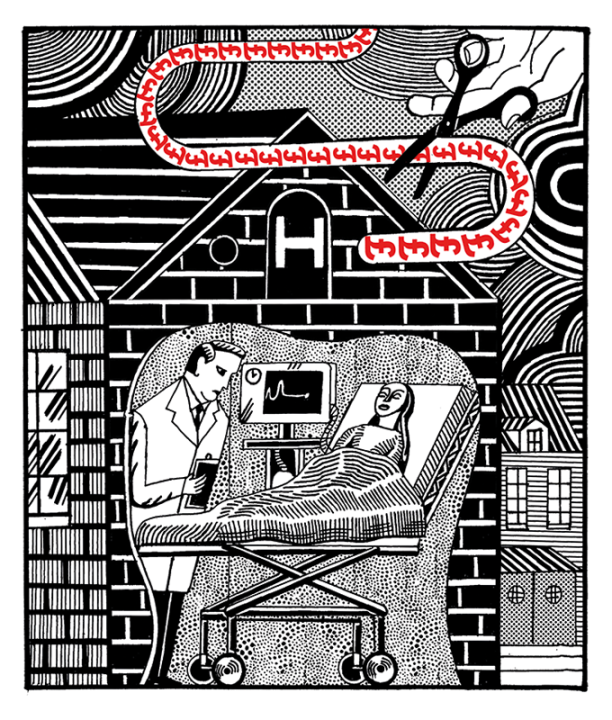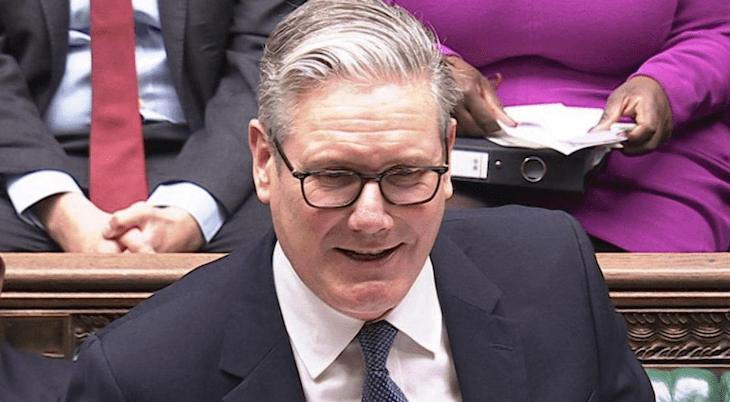
Every year, thousands of stories of abuse pour into Compassion in Care, a charity that supports whistleblowers in the care sector. Volunteers manning the charity’s helpline hear of old people dismissed as ‘end of life’, deprived of food and water, abandoned in corners with neglected bedsores, needlessly sedated to make them less time-consuming.
And now, says the charity’s founder and director Eileen Chubb, a former care whistleblower herself, they are bracing for ‘a massive increase in abusive cases’. That’s if the assisted suicide bill, which begins its journey through the Lords this week, becomes law. ‘We can foresee whistleblowers contacting us,’ Chubb tells me, ‘saying people died who didn’t want to die but were pushed into it, and the system failed them.’
That system is already far too ready to put people on a pathway towards death. ‘I’d be rich if I had a pound for every time someone says, “Don’t bother the doctor, she’s old and she’s going to die anyway.”’ Helpline volunteers regularly hear anguished stories from carers and families about old people denied basic care and attention. Four-fifths of callers mention the withdrawal of fluids.
Now, Chubb says, those same callers are disturbed by the prospect of a law which would institutionalise a state death service. ‘What we’re hearing is people constantly saying, “We’re really worried. It’s hard enough as it is. If you speak up and try to save a life, the attitude is – there’s something wrong with you, you should just turn a blind eye like the rest of us”.’
Many people in care will fall within the broad remit of the bill: those with a terminal diagnosis who might die in the next six months. The bill allows someone meeting that definition to receive lethal drugs, even if their sole reason for seeking an assisted death is depression, financial concerns or feeling like a burden.
Abuse victims, Chubb points out, are often too ashamed to tell others what is happening; and often, they want to die. ‘We’re going to fail them twice,’ she says. ‘Once because we let them be abused and once because we’re going to let them die because of their despair at being abused.’
Even without becoming law, the bill is already having an effect. Chubb has heard from carers who have tried to report abusive practices and ‘one of the abusive staff has turned round and said to them, “Well, this is all going to be legal soon”. People’s perception is that the right to life has shifted.’
Even if there were no abuse in care – and Chubb believes its scale is seriously underestimated – the crisis in the sector would still be a subject most of us would rather not dwell on. There isn’t enough money: local authorities say they have a total funding shortfall of £54 billion over the next five years, and in one survey a third of social care providers said they were considering leaving the market altogether. There aren’t enough staff: almost 400,000 people are stuck on waiting lists for care. Meanwhile, the population is rapidly ageing. By 2040, a fifth of the adult population in England is expected to be living with major illness.
Much of the care sector sees this bill as a new bias towards death, hardwired into the machine
Only the reluctance to think about hard realities can explain why so little has been said, in this context, about assisted suicide. Apart from Matthew Parris, who believes it would be a ‘healthy development’ if assisted suicide is ‘considered socially responsible – and even, finally, urged upon people’, few are prepared to make the link. Yet the warning lights are flashing. Care England says the sector is ‘under consulted, uncertain, and unprepared’, after a survey in which just 13 per cent of care homes said they would be able to manage the introduction of assisted suicide. The Orders of St John Care Trust – the country’s second-biggest not-for-profit care provider – has said the legislation poses a ‘substantial’ risk to older people. ‘It is without question,’ it says, that some people will consider assisted suicide ‘to protect the prospects of their loved ones and not because they wish to die’.
There is another, more systemic, kind of pressure, the charity warns. Older people in social care are seen as ‘a problem without a solution’, a burden on society. But at least, under the current law, they are not constantly wondering if they should request a dose of lethal drugs from the doctor. ‘A change in the law may unintentionally create a constant burden of deliberation, additional pressure through witnessing the choices of fellow residents to opt for assisted dying and potentially a stressful environment where residents perceive they are being continuously assessed about whether they qualify.’
The bill’s supporters have framed it as a targeted intervention, aimed at resolving a few tragic cases. But much of the care sector sees it as a change that will affect the whole of society: a new bias towards death, hardwired into the machine.
Few people have worked harder to improve care standards than Professor Keri Thomas. A former GP, she founded the Gold Standards Framework Centre in 1998; it is now the leading charitable training provider for the three million frontline staff in end-of-life care. Professor Thomas also chairs the Coalition for Frontline Care, a partnership of major organisations which calls for better training and the integration of health and social care.
Speaking in a strictly personal capacity, she describes the bill as ‘terrifying’. She can see the case for it, but says there is ‘a lack of safeguards for those at their weakest’. The gaps in current provision make the frail and ill even more vulnerable under the proposed legislation. ‘Assisted dying is not a “choice” if care is not yet good enough for everyone,’ she says. ‘People could be whisked along this system pretty quickly. And it’s a fully-funded free system, which is not what most people are getting. It could be easier to die than to live.’
The details of the bill only deepen her alarm. For instance, the text allows doctors to bring up the subject even when the patient hasn’t thought of it. ‘It feels so wrong to say, “Take these tablets and see you in three months… and have you thought of assisted dying?”. Most people do seek guidance from their doctors or other carers, and if one of the things you’re encouraged to bring up is assisted dying – that automatically says, “You’re on the scrapheap”.’

There is also no requirement for the assessing doctors to know the patient who is requesting an assisted death. That makes it much harder, Thomas says, to understand the patient’s wider context, history and current situation. ‘Is this person very depressed, and with some help and support they could change their mind and feel able to face life again? Is this what they really want? If no one knows the person making the request, to me that’s a real red flag.’
How widespread are those concerns? Doctors in general are split on the question, but the specialisms with most experience of end-of-life care are more likely to oppose the bill. The Association for Palliative Medicine and British Geriatrics Society, the big representative bodies, are firmly against it.
‘I’ve come across lots of patients who are probably subtly being abused by their families,’ says Dr Julie Barker, end of life clinical lead for NHS Nottingham and Nottinghamshire. ‘By which I mean manipulated. Sometimes that’s to go into a care home, sometimes that’s to alter wills. I know that a lot of my colleagues out there, in the medical profession, in the nursing profession and in carers groups, are concerned that that dynamic will be aggravated by the assisted dying bill.’
‘I’ve come across lots of patients who are probably subtly being abused by their families’
The bill’s proponents point to a series of checks and procedures: two doctors have to sign off on the request, as does a panel featuring a psychiatrist, lawyer and social worker. But the panel are only there to confirm that the person has six months to live and has basic decision-making ability. They are not there to help them get better support or to suggest that they reconsider. In fact, the Royal College of Psychiatrists has come out against the bill, because it does not give psychiatrists the chance to do their job of helping those with an unmet need.
The panel are also asked to detect coercion, but they don’t have any special investigative powers. They can ask third parties to testify, for instance, but unlike a court they can’t force them to give evidence.
Dr Barker is not reassured. ‘Even though I’ve done lots of specialist safeguarding, I wouldn’t feel confident currently in assessing for coercion. And I would say, objectively, I’m probably one of the most aware people among my profession.’
On the subject of safeguards, Eileen Chubb is even more sceptical. The proposed panels, she points out, are very similar to existing Safeguarding Adults Boards. ‘I’ve gone to hundreds of these so-called investigations, with the families of people in care. It is an absolute farce. It looks great on paper and it ticks a lot of boxes, but in reality most abuse is not even investigated.’
Even when it is investigated, complacency and battle-weariness mean that only ‘the bare minimum’ is actually done. When I suggest that coercion could instead be reported to the police, she laughs.
Yet the impact of the legislation would go far beyond those being coerced. Under the bill’s terms, anyone with a six-month diagnosis could receive an assisted death simply because they were poor, homeless, depressed, isolated or afraid. Assisted suicide, introduced like this, looks less like mercy than like a gigantic abdication of responsibility.
Dr Barker fears we are ‘sleepwalking’ into a huge societal change ‘in terms of how we respond to some of the most vulnerable people in our communities’. Chubb is more direct: ‘I’m horrified at the level of ignorance among so many of the MPs arguing for this. They don’t live in the real world.’








Comments